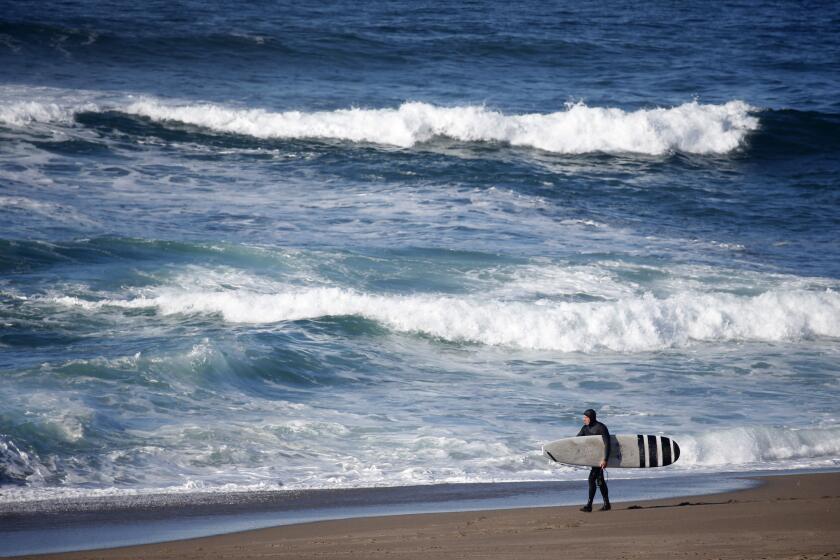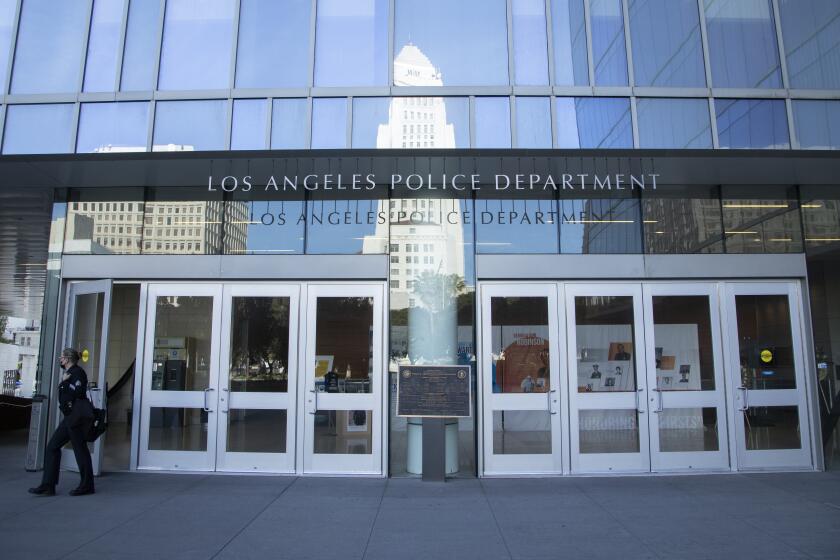Chief, City at Odds Over Agreement : LAPD: Officials say Williams’ $10-million claim is voided by pact he signed in June. His lawyer says the deal only covered events before its signing.
The city’s best defense against the $10-million claim by Los Angeles Police Chief Willie L. Williams may be an agreement signed this year in which the chief promised not to pursue legal action in connection with a Police Commission investigation of him, City Council members and legal experts said Thursday.
City Atty. James K. Hahn said the release signed June 20 by Williams and his attorney, Melanie Lomax, “is certainly going to be in our arsenal” for fighting the invasion of privacy and defamation claim filed Monday. But Hahn said the city attorney’s office may have a conflict of interest in defending against the claim, which would force the city to hire outside counsel.
The claim followed disclosures in The Times last Friday about the Police Commission’s investigation into whether Williams accepted free rooms in Las Vegas and then lied about it.
The City Council overturned a commission reprimand of the chief in exchange for Williams’ promise to release the city “from any liability whatsoever resulting from or concerning the Police Commission investigation . . . including but not limited to the improper release of personnel information.” He also “agrees not to make any such filing in the future,” the one-page agreement states.
“The release is as clear as could be,” said Councilman Joel Wachs, a non-practicing attorney who on Tuesday urged Williams to drop the claim or resign. “[He is] breaking his word. There have been people making accusations against him in the past that he hasn’t been truthful, and I think breaking the clear terms of this agreement only gives credibility to that charge.”
But Lomax said the release only covers events that occurred before its signing, and that the chief regained his right to legal action when more details of the investigation were published.
“That agreement relates exclusively to the leaks that had occurred as of that time,” she said. “The damage to his reputation has continued. This [agreement] was to bring the matter to a close. It has been illegally reopened. The agreement has been breached.”
Council President John Ferraro said the agreement had already been invoked once: When Williams requested reimbursement for $60,000 in legal fees, the city attorney reminded him of the agreement and rejected the request. Williams later announced an effort to raise the money to pay Lomax from private donations.
“It sounds like he or his counsel did not read the agreement that they signed, lately, before they filed the claim,” Ferraro said. “That agreement was well thought out. There would have been several [council members] who would not have voted [against the reprimand] if it hadn’t been for” the release.
Councilman Hal Bernson, who helped negotiate the agreement, said the June 20 agreement should be the city’s “No. 1 defense.”
“My understanding was we were going to be held harmless from any litigation,” Bernson said. “They waived any right to sue on this case. I don’t think they have a leg to stand on.”
Several legal experts said Thursday that the pact has some teeth, but added that Lomax’s argument that it only applies to what happened before its signing also has merit.
“The argument against him is substantial, but not an automatic winner,” said UCLA law professor Gary Schwartz, a tort expert.
Since Williams’ claim focuses on the city’s liability for the release of documents, the matter may turn on whether the leak occurred before or after June 20, law professors and lawyers said.
“If those documents were released to The Times before [the release was signed] then the release would be valid,” said Santa Monica attorney Larry Feldman.
But California’s so-called shield law protects journalists from revealing in a civil case when and how they obtained confidential information.
“The shield law protects the disclosure of unpublished information, which would include the date upon which this information had been obtained,” explained media law expert Douglas Merill.
Lomax contends that the date of the disclosure is irrelevant, saying the alleged damage to the chief occurred when the confidential information was circulated last Friday.
Even as she defended her client’s right to pursue the claim Thursday, Lomax said the chief might consider dropping it if the City Council could somehow “hold the Police Commission accountable” for release of the chief’s personnel file, provide a “safeguard and protection against continuous leaks,” and “reaffirm their finding that the chief was improperly reprimanded.”
A settlement “would have to include an element of redress as it relates to the damages already sustained to the career and standing of Willie Williams,” Lomax said, noting that she had not discussed the terms of a non-financial settlement with her client. “This isn’t about money. It’s about a principle, and it’s about the chief having the opportunity to prove that he has engaged in no misconduct, and about city officials leaking documents that are legally private and confidential.”
As debate swirled, Williams spent Thursday at a press conference on the City Hall steps announcing an anti-gang action plan, at a luncheon in Hollywood with the Los Angeles Press Club, and at an evening session with African American police officers sponsored by the Oscar Joel Bryant Assn.
At the evening event, Williams told about 200 black officers that filing the claim was “the toughest decision I’ve ever had to make.” He said he was compelled to act because the investigation amounted to a personal attack. The chief was greeted by a standing ovation.
More to Read
Start your day right
Sign up for Essential California for news, features and recommendations from the L.A. Times and beyond in your inbox six days a week.
You may occasionally receive promotional content from the Los Angeles Times.






